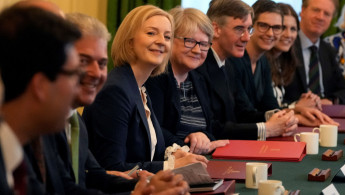What does the new UK cabinet mean for the Middle East?
UK Prime Minister Liz Truss' choices for her new cabinet will likely have important ramifications on the country’s relationship with the Middle East.
Members of the new government have a record of being staunchly pro-Israel, taking a hard stance against migrants, and promoting the extraction of fossil fuels that could worsen the impact of climate change on the Global South.
New names for some of the most important portfolios (exchequer, foreign office, home, trade) in the UK Cabinet under #LizTruss. pic.twitter.com/YVaYJtuQK8
— Dhruva Jaishankar (@d_jaishankar) September 6, 2022
Migrants and the Rwanda policy
Incoming home secretary Suella Braverman has repeatedly expressed a hardline stance on migrants entering the UK.
She is in favour of the previous administration’s controversial policy of forcibly sending asylum leaders to Rwanda, and criticised the European Court for Human Rights ruling preventing the departure of the first plane to Rwanda in July.
Braverman accused the court of "thwarting our democracy" and urged Britain to leave the European Convention on Human Rights.
Whitehall source says government is pulling second reading of the bill of rights - describes it as a "total mess" and that it needs a radical overhaul to stop it being vulnerable to multiple amendments
— Jessica Elgot (@jessicaelgot) September 7, 2022
On Wednesday, the government shelved a proposed piece of legislation called the Bill of Rights - meant to replace the ECHR - that reportedly sought to lower the level of protections given to human rights, especially those of migrants and refugees, in the UK.
Suella Braverman has also controversially expressed her admiration for the British Empire, which colonised nations in the Middle East, Africa and Asia and exploited their resources.
Palestine - Israel
New Foreign Secretary James Cleverly has in the past expressed a staunch pro-Israel stance. In May last year, following an Israeli bombing campaign against Gaza which killed 49 Palestinians, Cleverly said that "Israel has a right to defend itself".
At the time, he also refused to say whether British weapons sold to Israel were being used by Israeli forces in their attack on Gaza.
Cleverly’s stance on Israel appears to echo that of Prime Minister Liz Truss, who has repeatedly expressed support for Israel.
Iran deal
Cleverly has experience in dealing directly with Iran.
He met in November 2021 with top Iranian officials including President Ebrahim Raisi to negotiate the release of Iranian-British nationals and Nazanin Zaghari-Ratcliffe and Anoosheh Ashoori.
Discussions on Iran’s nuclear deal also took place at that time, according to reports.
"The Truss government is likely to follow the same path as the Johnson government on the Iran nuclear deal," Dr Lina Khatib, Director of the Middle East and North Africa programme at Chatham House told The New Arab, "with a continued commitment to keeping negotiations over concluding the Iran nuclear deal going".
Climate crisis
Jacob Rees-Mogg, Britain’s new energy minister, has repeatedly supported the use of fossil fuels.
"We need to be thinking about extracting every last cubic inch of gas from the North Sea because we want security of supply," Rees-Mogg said in an interview earlier this year.
Green campaigners have criticised the appointment of Jacob Rees-Mogg as Business Secretary, which will see him in charge of the energy and climate brief 👇 https://t.co/SS5MayrYev
— Evening Standard (@EveningStandard) September 7, 2022
Countries in the Middle East and Asia are some of the most vulnerable to climate change. Britain, along with other developed nations, has repeatedly been criticised for its carbon emissions that will likely have an outsized impact on countries in the Global South.
The Liz Truss cabinet is also likely to maintain a strong relationship with Gulf states with a focus on their oil exports, according to Khatib. The administration is not likely to include any discussion of human rights abuses that Saudi Arabia in particular has been accused of.
"While Foreign Secretary, Truss expressed the importance of the UK’s trade relations with GCC countries and this is a position her government is likely to maintain, which signals focusing on trade and energy in the UK government’s interactions with GCC countries as opposed to widening the agenda to discuss other issues," Khatib said.





 Follow the Middle East's top stories in English at The New Arab on Google News
Follow the Middle East's top stories in English at The New Arab on Google News


